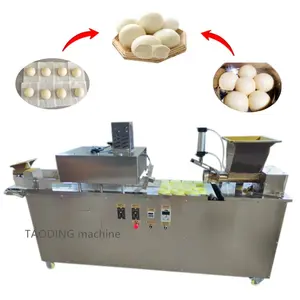(69799 products available)












































































































































































































Commercial pizza machines are available in several types, and each offers different advantages. Choosing the correct type of production machine is crucial for increasing productivity and meeting market demand.
Dough mixers
Pizza dough mixers combine large quantities of dough to ensure proper mixing and consistent texture. These mixers require heavy-duty operations with fast stirring or kneading functions. Being large makes them suitable for restaurants to meet their dough production needs. In other words, a dough mixer for pizza, especially large capacity, offers greater efficiency and consistency in producing high-demand pizza dough.
Dough sheeters
Customers dislike thick and uneven pizza bases, which is why large pizza restaurants use sheeters. They help flatten the dough uniformly to achieve the same thickness consistently across many pizzas. It promotes consistent baking and better-tasting pizza. A dough sheeter saves time in large-scale production by ensuring that the dough is rolled out evenly and quickly.
Ovens
The baking process is an important part of pizza production. Different types of ovens bake pizzas in different ways. Brick ovens add a smoky flavor because they are heated with wood and bricks. Conveyor ovens are efficient because they are large with quick cooking times. These machines ensure high-volume baking meets large-scale production needs.
Pizza presses
Presses are machines that people use to compress or shape things. Pizza presses shape pizza dough into consistent rounds. Large presses operate quickly to meet high-volume production needs. They ensure uniformity in size and prevent wastage. This makes presses important machines in large restaurants.
Slicers and redeemers
Many large pizzerias serve cut pizzas quickly using slicers. They also serve other cut meats. They ensure consistent slices and faster service. A redeemer is a tool used to remove the pizza crust from the slicer to ensure correct portions and wastage reduction.
What do pizza machines do? Pizza machines function to automate dough preparation. They ensure uniform thickness, proper tensions, and quicker process times. Some types of machine ovens, like conveyor ovens, enhance the baking process by quickly moving pizzas through the oven chambers. In large-scale production, machines help meet high-demand needs while ensuring consistency in food quality.
Pizza machines are designed considering ergonomics to make them easy to operate, maintain and clean. This increases workplace efficiency. Their form factor also fits limited kitchen spaces, which depend on their size and layout. Commercial machines are sleek and modern to reflect professionalism in the restaurant business.
The following are situations in which a large dose of food machinery is ideal:
In all these scenarios, the machines help to deal with large amounts of work while making pizza of the same quality each time.
This section gives guidelines to consider when selecting pizza-making machines.
Production capacity
The quantity of material a machine can handle daily is one of its most important features. The production capacity of a pizzeria or restaurant determines the type of machine they need. Large-scale operations require high-capacity ovens, mixers, and sheeters. Demand forecast and peak period handling capability assessment determine the operational capacity required.
Dough mixer choice
The type of dough mixer chosen for pizza depends on how much work it has to do. A commercial dough mixer is best for busy restaurants. A small business can use a home one. A sheeter or pizzer press is used to evenly flatten the dough. Larger presses are better for big batches.
Oven type
Conveyor ovens, deck ovens, and other types of commercial ovens can all accomplish massive baking tasks. The type of power used to heat the oven affects how well it bakes pizza. For example, conveyor ovens are great for large quantities because they move pizza through baking chambers quickly. A deck oven is better for carefully baking each pizza in batches.
Ease of use and cleaning
When deciding, remember that machines should be simple to operate and clean. Look for ones that have easy controls and cleaning systems. Simple parts make it easier for workers to learn how to use the machine and keep the workspace clean.
Durability and warranty
Durability directly impacts the cost of ownership as strong machines last longer and require fewer repairs. A big pizzeria needs reliable machines that won't frequently break down.
Budget and costs
Certain factors impact the overall cost. These factors include how much energy the machine uses and how often parts like blades need replacing. A smaller kitchen may not have as many mechanical requirements, so the cost of upkeep will be lower.
A1: A natural gas pizza oven is the best oven for baked goods to enhance their flavor. Other ovens like electric and wood-fueled ovens are also suitable for baking some types of pizza, like Neapolitan and Sicilian. Conveyor ovens are best for baking many pizzas quickly since they continuously move pizzas through heating zones.
A2: A small pizzeria should not get a large dough mixer. It should get one that is small, like a countertop stand mixer, to handle a few batches at a time. For big places, machines like commercial spiral mixers and digital mixer controllers can manage really big batch orders fast and efficiently. These big mixers are tough enough to handle a lot of work every day.
A3: A pizza press machine is used to flatten dough evenly. This makes each crust the same thickness, which is important for baking evenly every time. Larger presses are better when making a lot of pizzas fast since they can handle big batches of dough all at once.
A4: Dough mixers and sheeters work well together in commercial bakeries. A sheeter rolls dough evenly, and a mixer like a stand mixer with a paddle attachment combines ingredients perfectly. This speedy duo helps bake tasty treats faster.
A5: Yes, pizza machines aid catering by quickly churning out dozens of pies for big crowds. Pizzeria presses and ovens get lots done fast, keeping hungry guests happy at parties or gatherings without long waits.